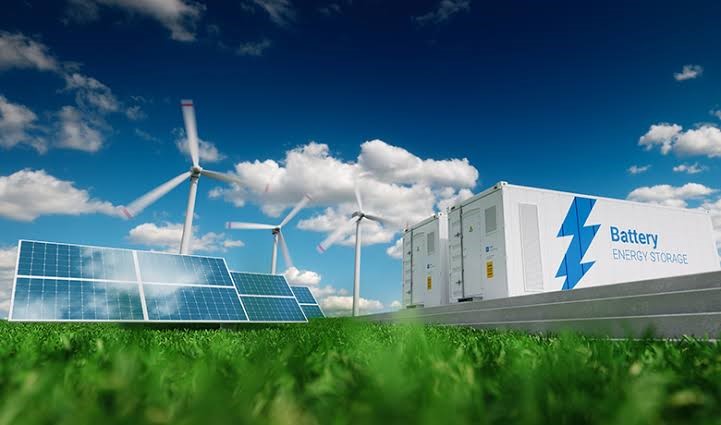BATTERY STORAGE FUELS INDIA’S ENERGY FUTURE
BATTERY STORAGE FUELS INDIA’S ENERGY FUTURE
Syllabus:
GS Paper – 2 : Government Policies & Interventions
GS Paper – 3: Renewable Energy
Why in the News?
India’s ambitious clean energy goals require a major boost in energy storage capacity. BESS (Battery Energy Storage System), a crucial component of energy storage batteries, are central to this mission, ensuring grid stability and enabling large-scale renewable energy integration. A recent editorial highlights India’s slow BESS progress, despite strong policy backing, urging accelerated deployment and global partnerships to enhance energy storage in India. Understanding what is energy storage system (ESS) and its importance is crucial for grasping the significance of this development.
ENERGY SECURITY REDEFINED
- Four Pillars: Modern energy security now hinges on availability, accessibility, affordability, and environmental acceptability, with a growing focus on climate resilience and sustainability.
- Green Shift: Climate change and geopolitical instability have repositioned renewables as not only clean but strategic energy assets.
- SDG Linkage: Renewable energy and storage, including ESS (Energy Storage System), are key to fulfilling Sustainable Development Goal 7 (SDG 7), which advocates universal clean energy access.
- Environmental Trade-offs: Environmental acceptability implies managing trade-offs like pollution, biodiversity loss, and emissions in energy policymaking.
- Policy Realignment: There is a shift from fossil fuel-centric planning to green energy prioritisation, demanding storage integration for resilience and efficient power storage solutions.
ROLE OF BESS
- Core Utility: BESS (Battery Energy Storage System) ensures grid stability, manages demand fluctuations, and enables peak load shifting, making renewable energy more viable. It plays a crucial role in load balancing, frequency control, and voltage stability, especially during peak demand periods.
- Tech Advantage: Battery storage systems offer scalability, affordability, rapid deployment, and geographical flexibility, unmatched by many other energy storage technologies, including battery storage power stations.
- Cleaner Grids: Integrating BESS can reduce greenhouse gas emissions by smoothing renewable output and reducing reliance on fossil fuels.
- Energy Equity: BESS facilitates microgrids and decentralised energy, bringing clean power to remote or underserved areas.
- System Reliability: It acts as a buffer during supply shortfalls or demand surges, improving energy security and resilience.
INDIA’S STORAGE LANDSCAPE
- Ambitious Target: India aims for 500 GW of non-fossil power capacity by 2030; 217.62 GW is already achieved (as of Jan 2025), including significant solar power and wind power installations.
- BESS Goal: A target of 47 GW of battery storage by 2032 has been set to support renewable energy storage and integration, including solar energy storage systems.
- Policy Measures: Steps like Viability Gap Funding and waivers for transmission charges support early adoption of BESS and other energy storage batteries.
- Deployment Gap: Progress has been slow, hindered by investment delays, mineral dependencies, and limited grid upgrades.
- Call to Action: The Economic Survey 2024-25 urges focus on innovation, financing, and critical infrastructure to scale BESS and other energy storage systems in India, while also considering energy storage obligations for power utilities.
CHALLENGES TO DEPLOYMENT
- Cost Barrier: While prices have fallen 90% in 15 years, initial capital costs remain high for many projects in the battery energy storage system market.
- Mineral Access: BESS relies on critical minerals like lithium and cobalt, most of which are imported, raising strategic risks.
- Tech Indigenisation: Lack of domestic manufacturing for advanced lithium-ion batteries delays technology indigenisation and deployment of battery storage power stations.
- Market Fragmentation: The absence of market mechanisms and standard contracts slows utility-scale storage adoption, necessitating comprehensive battery-based energy storage analysis.
- Grid Integration: Existing grids lack the flexibility and digital infrastructure needed for effective BESS utilisation and grid energy storage, highlighting the need for updated energy storage regulations.
INNOVATIVE PARTNERSHIPS
- Pilot Project: Delhi’s BESS pilot, involving BSES Rajdhani, IndiGrid, and GEAPP, shows how multi-stakeholder collaboration drives change and improves energy efficiency.
- Concessional Funding: Alliances involving public, private, and philanthropic entities can offer low-cost capital and technical expertise.
- Regulatory Reform: Pilots help frame regulatory frameworks and build tech playbooks for scaling up nationally.
- Global Support: India’s participation in the GEAPP-led BESS consortium aligns it with global clean energy efforts.
- Scalable Models: Successful pilots can act as templates for replication, especially in urban grids and industrial corridors, enhancing overall grid management and exploring diverse storage options like pumped hydro storage.
THE ROAD AHEAD
- Finance First: Scaling BESS needs concessional financing models, green bonds, and incentives for private sector investment in the energy storage market, including mechanisms for energy arbitrage.
- Tech Development: India must invest in battery R&D, local production, and recycling for long-term sustainability, including advancements in solar energy storage systems.
- Policy Push: Timely policy execution, ease of business, and faster project clearances are needed to bridge delays in energy storage deployment.
- Grid Upgrade: A modern, digitally enabled grid infrastructure is key to accommodate storage and variable renewable energy sources, addressing challenges posed by intermittent power sources.
- Leadership Role: By overcoming these gaps and focusing on energy storage value stacking, India can emerge as a global leader in clean energy and BESS deployment.
CONCLUSION
Battery Energy Storage Systems (BESS) are indispensable for India’s clean energy ambitions. As the nation ramps up renewable capacity, energy storage technologies must keep pace. With strategic investment, innovation, and regulatory support, India can lead the global south in energy transition, ensuring affordable, clean, and reliable power supply — aligned with sustainability and energy independence goals. The focus on battery waste management and the development of a circular economy for energy storage solutions will be crucial for long-term success in this sector, contributing significantly to carbon emissions reduction and enhancing overall power supply reliability.
MAINS PRACTICE QUESTION
Discuss the role of Battery Energy Storage Systems (BESS) in enabling India’s renewable energy transition. Highlight the key policy, technological, and financial challenges and suggest measures to accelerate BESS deployment for a cleaner energy future.




